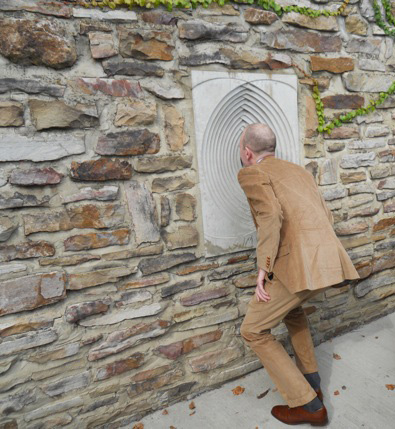Lorin Stein: The Guardian of a Pantheon (2)
by Silvia Duarte / October 25, 2010 / No comments

Lorin Stein enjoying Yayoi Kusama’s Infinity Dots Mirrored Room at the Mattress Factory
The Paris Review is also well known for author interviews. Starting with E. M. Forster in 1953, these conversations are a sort of compass for those who want to understand what was in the mind of the most important writers of the last 57 years. What is the criterion to decide who is going to be interviewed?
I haven’t made a study of the history of the interviews, but my sense is that the interview isn’t used as a tool for drawing American attention to writers who are very well known abroad, but rather used to draw attention to writers who are already very influential for American writers. For instance, I didn’t assign the two interviews that are in the fall issue—the Houellebecq interview or the Norman Rush one but I hustled the interviewers along. For me these writers should be better known because they have a really disproportionate influence.
Samuel Delany, for example, is a writer who is being interviewed right now. When I interviewed Jonathan Lethem, he gave me a reading list, and the first thing I had to read was Samuel Delany. I don’t think Delany’s books have ever sold many copies, but if you want to know what’s going on in American literature, you had better know about him and his literature. So, in that sense, it may become a more parochial interview than it was; it may do less to encourage international understanding, but I think that now the literary community in the United States feels that it’s more marginalized than it used to be.
How do literary institutions and awards contribute to this feeling of marginalization?
There is a tendency for the big institutions to try to evangelize and give big prizes to under-known writers or to use prizes to bring writers into the public view. And I think that’s often a mistake because they may be overspending their cultural capital. I think that the use of these awards is in consolidating literary opinion—especially at a moment when there are no more book reviews or newspapers. I just think tactically that the way to use the National Book Award or the Pulitzer is to ratify an opinion that already exists in the literary community. You don’t try to make an opinion that doesn’t already exist.
Ratify an opinion that already exists. That’s exactly how the interviews in The Paris Review got started.
That’s right, and I think that that’s good. We want it to be a pantheon. When the founders of The Paris Review started the interviews, they just found their favorite writers before they died and they said, “you’re our heroes; how do you do it?” and I think that’s a very powerful idea. They weren’t saying, “I think life hasn’t been fair to such-and-such writer”–well, there may have been an element of that, but the main motive was always pure adoration. So I want us to interview people we really adore.
But it’s impossible to read everything. Is that not dangerous?
It may be that our tastes are narrow, but I would rather take that risk, because at the end, when you wake up at four in the morning, nervous, at least you know what you love. I would rather be able to defend the interviews that we do than have to explain, uncomfortably, why we haven’t done some interviews.
You said in an interview that you have been reading The Paris Review since you were 14. Of all the interviews you read, which have you have liked the most?
My favorite interviews are all–for some reason–of English writers: P.G. Wodehouse, Philip Larkin, and Henry Greene. Terry Southern’s interview with Greene I especially love. Southern: “What was the basic situation, as it occurred to you, for Loving?” Green: “I got the idea of Loving from a manservant in the Fire Service during the war. He was serving with me in the ranks, and he told me he had once asked the elderly butler who was over him what the old boy most liked in the world. The reply was: ‘Lying in bed on a summer morning, with the window open, listening to the church bells, eating buttered toast with cunty fingers.’ I saw the book in a flash.”
Which of the interviews published in The Paris Review would you not include if you could go back and be the editor since 1953?
Oh, if I had one I would never tell!

Stein looks at Winifred Lutz’s Garden Installation at the Mattress Factory
Has a writer ever rejected an interview with The Paris Review?
Yes. It just happened with Ira Glass. I’m hoping he’ll change his mind. Ira Glass started a program called This American Life that consists of people telling true stories from their lives—and they’re very beautifully edited. I thought it would be fascinating to get him to talk about how he gets people to tell stories on the radio–and he wanted to do it, but he is too busy. Hemingway refused and refused and refused and then finally said yes, but then George [Plimpton] had to go and find him in Cuba. A lot of writers are very afraid of talking about what they do. And they’re right!
You said that the literary community in the United States feels more marginalized than before, but the permanent secretary of the Swedish Academy said that the United Sates is too insular in terms of literature. What do you think of this statement?
I think that’s true and false. You can’t really generalize about the American reading public. We have a huge reading public. FSG just published a French writer who is unknown in France. He got a very good review in The New Yorker and his book will sell a few thousand copies, I suspect. That means that more Americans will read him than people in France. It can be done. What Barbara Epler [editor in chief of New Directions Press] does, can be done. Compared to the vast amount that is read in America, world literature makes up a small percentage, but it still represents a huge market. I would also say, in a defensive way, that we produce so much literature, and we export so much literature, it would be asking a lot for us to import as much foreign literature as Holland, for example.
Hemingway said to The Paris Review that “the most essential gift for a good writer is a built-in, shockproof, shit detector.” Has the current method of marketing destroyed these detectors somehow?
I think these detectors are inherently fragile. Remember, when Hemingway gave that interview, he had already written The Old Man and the Sea. One must take all talk of bullshit detectors with a grain of salt.
Faulkner said that the best job that was ever offered to him was to become a landlord in a brothel. In his opinion the place was quiet during the morning hours. There was enough social life in the evening. All the bootleggers in the neighborhood would call him “sir.” And he could call the police by their first names. What is the ideal occupation for a writer in these days?
If you want to be a great French poet, clearly, you should teach or translate English. I am thinking of Gautier, Baudelaire, Verlaine, Mallarme. Borges and Larkin seemed to draw strength from their jobs as librarians. My friend Philip Connors (a recent contributor to The Paris Review) gets his best writing done during the summer, when he works in a tower as a fire lookout. Kerouac and Gary Snyder did the same. Marguerite Yourcenar wrote her great Memoirs of Hadrian on a cross-country train. Now my job requires me to take that same train. It hasn’t occurred to me to write a single word. Norman Rush blossomed into greatness thanks to the years that he and his wife ran the Peace Corps office in Botswana–though he wrote the novels after they left. One would have thought Melville had the perfect job, a sinecure as a customs inspector, but it didn’t help. Wallace Stevens, as we all know, was a giant in the insurance business. He made up his poems on the way to and from the office.
Everyone says editing kills you as a writer, but even here there are counterexamples. There seems to be no profession that can kill the spark, except maybe writing for the movies or teaching creative writing–and yet many writers do these things and muddle through.
Read Silvia’s bio.




